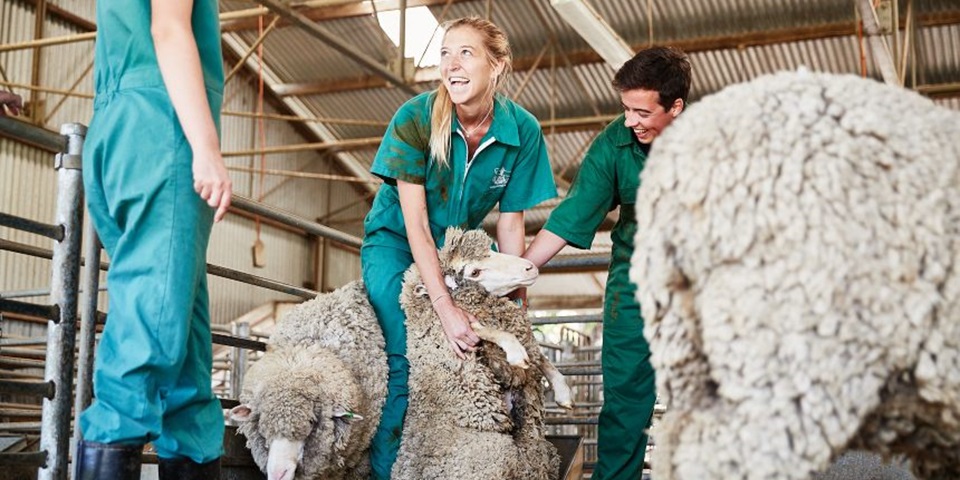News
Get to know the School of Agricultural Sciences at Murdoch

Welcome to a school where theory jumps off the pages of your textbook and into real life.
Did you know that by 2050, a mindboggling 70 per cent more food will be needed to feed the world’s population? Or that the Australian livestock industry has set a target for beef, lamb and goat production to be carbon neutral by 2030?
These are just some of the challenges facing our food production systems. Instead of looking to others to make a difference, it could be you helping solve our most pressing issues.
The agricultural industry is on the cusp of a radical new era, with an explosion in innovation and a growing number of agribusiness and agritech startups. Think: precision livestock production focussed on sustainability and welfare, drone farming, smart-crop monitoring, sustainable materials for the fashion and luxury goods industry, and reducing greenhouse gas emissions from food and fibre production.
So, where do you sign up? Read on, and get to know our School of Agricultural Sciences.
What’s special about the School of Agricultural Sciences at Murdoch?
There is no better place if you’re interested in a career in this industry.
The magic can be found in what we do on campus day in, day out. And it’s this commitment and passion for agriculture that helped build such a widely-respected school. For example the federal government’s ‘Excellence in Research Australia’ has repeatedly rated our work as being of world-class standard.
Here are just some of the unique facilities we have access to at the school:
Murdoch University Farm
We’re the only Australian city university with a campus farm. We also have an off campus farm located in Whitby, less than an hour south of Perth. The work and research carried out here addresses real-world issues like food production, animal health and welfare, food security, and environmental conservation. Find out more.
Murdoch Veterinary Hospital
Western Australia’s very own veterinary teaching hospital. Learn from leading animal health experts, with all the latest equipment available. Animals treated here include cows, sheep, horses, and domestic pets like cats and dogs. Find out more.
Food Futures Institute
This is where the best of the best study safe and sustainably-produced food. The FFI houses several impressive research-driven centres: Crop and Food Innovation, Animal Production and Health, and Sustainable Farming Systems. Find out more.
Our content and activities are designed to nurture curiosity and innovation. We know that theory comes to life through practice, so there’s plenty of hands-on training that goes beyond the typical classroom. For example, learning about low-stress animal handling and horse hoof care, preparing cattle for the Perth Royal Show, and caring for our Merino sheep.
Even if you’ve never considered a career in this industry, sometimes the most rewarding journey comes from a place you’d least expect. Learn more about why Murdoch is the top choice for future agricultural science professionals.
Meet your academics
You won’t just be reading any old textbook – you might even learn from the very people who wrote the textbook!
Our researchers include the distinguished Professor Rajeev Varshney, agricultural scientist and Director of the Centre for Crop and Food Innovation. Amongst the dozens of accolades he’s received, he was also recently elected as a Fellow of the Royal Society and in doing so, joined the giants of science such as Stephen Hawking, Isaac Newton, Charles Darwin and Albert Einstein.
We celebrate many other passionate and award-winning professionals on our team including Professor Davey Jones, Soil and Environmental Science; Professor Richard Bell, Centre for Sustainable Farming Systems; Professor Andrew Thompson, animal production and Murdoch’s Farm Animal Welfare team.
What are we up to now? There’s plenty!
- Cultivating a better barley for beer
- Examining the genome of fruits to withstand the effects of climate change
- Working with farmers improve health and productivity of their animals, and
- Methods to reduce methane emissions from sheep and cattle.
Find out more about our research projects and meet our team.
A fork in the road: your life, your career path
What lies ahead is up to you. A nutritionist formulating balanced diets to maintain animal health. A geneticist helping famers breed animals and crops that are resistant to diseases. A behaviorist studying the psychology of animals living in different environments. A sustainability-focused farmer with a holistic approach to agriculture. Or working on cutting edge innovations using data analytics, automation, and AI. There are so many opportunities with a degree from our school. Here’s how to get there.
Bachelor of Agricultural Science majors:
- Animal Health (pathway into Veterinary Science)
- Animal Science (pathway into Veterinary Science)
- Crop and Pasture Science
Bachelor of Agricultural Science / Bachelor of Business majors:
- Animal Health (pathway into Veterinary Science)
- Animal Science (pathway into Veterinary Science)
- Crop and Pasture Science
- International Business
- Management
- Marketing
Take a look at our postgraduate courses if you’re ready for the next step in your career.
Building a brighter future, together
We all have to do our bit to make the world a better place. Sustainability and conservation have been core values since we opened our doors in the 1970s, and it’s still at the heart of everything we do. Universities have a responsibility to equip the next generation of leaders and innovators to understand global challenges and the role they play in rising to meet them. Join us and be part of the change the world urgently needs.
Discover more about our unique, world-class School of Agricultural Sciences.